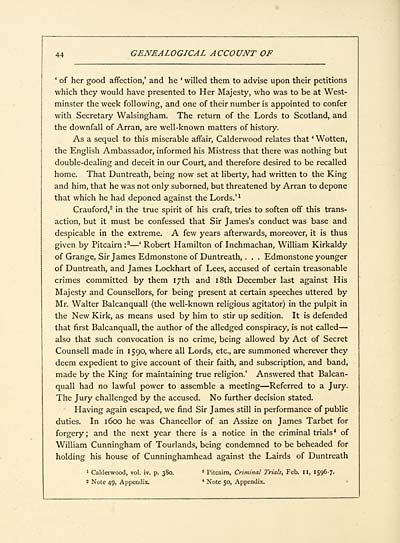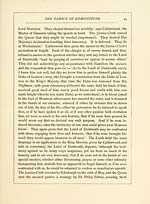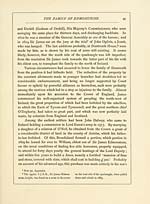Download files
Complete book:
Individual page:
Thumbnail gallery: Grid view | List view

44 GENEALOGICAL A CCO UNT OF
' of her good affection,' and he ' willed them to advise upon their petitions
which they would have presented to Her Majesty, who was to be at West-
minster the week following, and one of their number is appointed to confer
with Secretary Walsingham. The return of the Lords to Scotland, and
the downfall of Arran, are well-known matters of history.
As a sequel to this miserable affair, Calderwood relates that ' Wotten,
the English Ambassador, informed his Mistress that there was nothing but
double-dealing and deceit in our Court, and therefore desired to be recalled
home. That Duntreath, being now set at liberty, had written to the King
and him, that he was not only suborned, but threatened by Arran to depone
that which he had deponed against the Lords.' 1
Crauford, 2 in the true spirit of his craft, tries to soften off this trans-
action, but it must be confessed that Sir James's conduct was base and
despicable in the extreme. A few years afterwards, moreover, it is thus
given by Pitcairn : 3 — ' Robert Hamilton of Inchmachan, William Kirkaldy
of Grange, Sir James Edmonstone of Duntreath, . . . Edmonstone younger
of Duntreath, and James Lockhart of Lees, accused of certain treasonable
crimes committed by them 17th and 18th December last against His
Majesty and Counsellors, for being present at certain speeches uttered by
Mr. Walter Balcanquall (the well-known religious agitator) in the pulpit in
the New Kirk, as means used by him to stir up sedition. It is defended
that first Balcanquall, the author of the alledged conspiracy, is not called —
also that such convocation is no crime, being allowed by Act of Secret
Counsell made in 1590, where all Lords, etc., are summoned wherever they
deem expedient to give account of their faith, and subscription, and band,
made by the King for maintaining true religion.' Answered that Balcan-
quall had no lawful power to assemble a meeting — Referred to a Jury.
The Jury challenged by the accused. No further decision stated.
Having again escaped, we find Sir James still in performance of public
duties. In 1600 he was Chancellor of an Assize on James Tarbet for
forgery; and the next year there is a notice in the criminal trials 4 of
William Cunningham of Tourlands, being condemned to be beheaded for
holding his house of Cunninghamhead against the Lairds of Duntreath
1 Calderwood, vol. iv. p. 380. * Pitcairn, Criminal Trials, Feb. II, 1596-7.
2 Note 49, Appendix. ' Note 50, Appendix.
' of her good affection,' and he ' willed them to advise upon their petitions
which they would have presented to Her Majesty, who was to be at West-
minster the week following, and one of their number is appointed to confer
with Secretary Walsingham. The return of the Lords to Scotland, and
the downfall of Arran, are well-known matters of history.
As a sequel to this miserable affair, Calderwood relates that ' Wotten,
the English Ambassador, informed his Mistress that there was nothing but
double-dealing and deceit in our Court, and therefore desired to be recalled
home. That Duntreath, being now set at liberty, had written to the King
and him, that he was not only suborned, but threatened by Arran to depone
that which he had deponed against the Lords.' 1
Crauford, 2 in the true spirit of his craft, tries to soften off this trans-
action, but it must be confessed that Sir James's conduct was base and
despicable in the extreme. A few years afterwards, moreover, it is thus
given by Pitcairn : 3 — ' Robert Hamilton of Inchmachan, William Kirkaldy
of Grange, Sir James Edmonstone of Duntreath, . . . Edmonstone younger
of Duntreath, and James Lockhart of Lees, accused of certain treasonable
crimes committed by them 17th and 18th December last against His
Majesty and Counsellors, for being present at certain speeches uttered by
Mr. Walter Balcanquall (the well-known religious agitator) in the pulpit in
the New Kirk, as means used by him to stir up sedition. It is defended
that first Balcanquall, the author of the alledged conspiracy, is not called —
also that such convocation is no crime, being allowed by Act of Secret
Counsell made in 1590, where all Lords, etc., are summoned wherever they
deem expedient to give account of their faith, and subscription, and band,
made by the King for maintaining true religion.' Answered that Balcan-
quall had no lawful power to assemble a meeting — Referred to a Jury.
The Jury challenged by the accused. No further decision stated.
Having again escaped, we find Sir James still in performance of public
duties. In 1600 he was Chancellor of an Assize on James Tarbet for
forgery; and the next year there is a notice in the criminal trials 4 of
William Cunningham of Tourlands, being condemned to be beheaded for
holding his house of Cunninghamhead against the Lairds of Duntreath
1 Calderwood, vol. iv. p. 380. * Pitcairn, Criminal Trials, Feb. II, 1596-7.
2 Note 49, Appendix. ' Note 50, Appendix.
Set display mode to:
![]() Universal Viewer |
Universal Viewer | ![]() Mirador |
Large image | Transcription
Mirador |
Large image | Transcription
Images and transcriptions on this page, including medium image downloads, may be used under the Creative Commons Attribution 4.0 International Licence unless otherwise stated. ![]()
| Histories of Scottish families > Genealogical account of the family of Edmonstone of Duntreath > (62) |
|---|
| Permanent URL | https://digital.nls.uk/95354199 |
|---|
| Description | A selection of almost 400 printed items relating to the history of Scottish families, mostly dating from the 19th and early 20th centuries. Includes memoirs, genealogies and clan histories, with a few produced by emigrant families. The earliest family history goes back to AD 916. |
|---|

